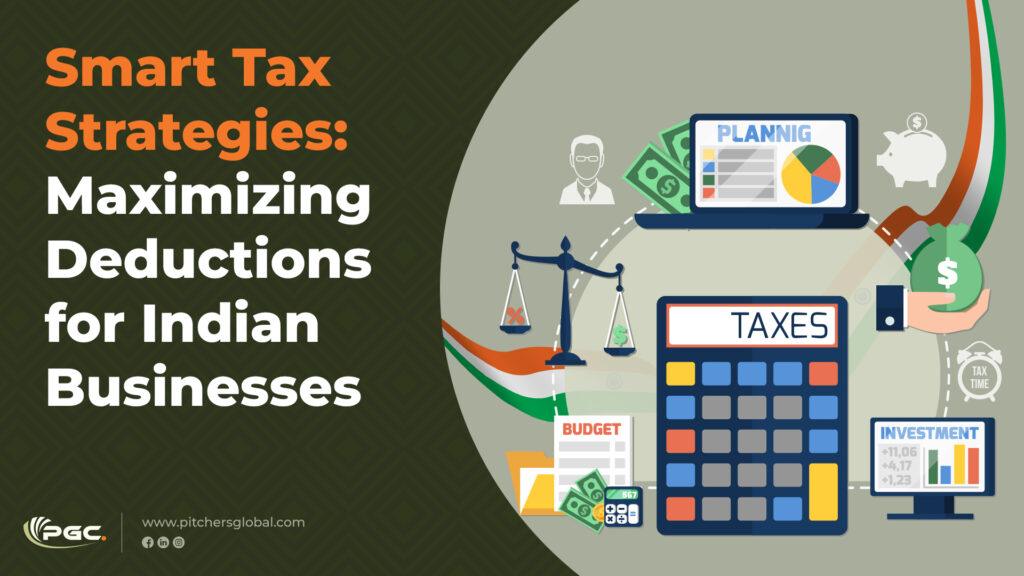Running a tech startup in India is an exciting journey, but managing taxes effectively is key to maximizing profits and sustaining growth. For CEOs like Ananya Kapoor, staying ahead in a dynamic tax landscape requires innovative strategies to reduce liability and optimize deductions.
Here’s a comprehensive guide to help Indian businesses leverage tax laws effectively by maximizing deductions with Tax strategies.

Smart Tax Strategies: Maximizing Deductions for Indian Businesses
1. Understand Your Deductible Business Expenses
Claiming legitimate business expenses is the foundation of tax efficiency. These include:
- Salaries and Wages: Payments to employees, freelancers, and consultants.
- Office Rent and Utilities: Expenses like electricity, water, and internet.
- Marketing and Advertising Costs: Digital campaigns, print media, and events.
- Travel and Accommodation: Costs for business trips, both domestic and international.
Pro Tip: Maintain detailed records and proper documentation to support your claims.
2. Leverage Depreciation on Assets
Depreciation on assets like office equipment, machinery, and vehicles can reduce taxable income. The Income Tax Act provides specific rates for different asset classes.
How to Maximize:
- Use the accelerated depreciation benefit for certain assets.
- Ensure accurate categorization and tracking of asset life cycles.
3. Benefit from Startup-Specific Tax Incentives
India offers tax incentives tailored for startups under the Startup India initiative:
- Tax Holiday: Eligible startups can claim a 3-year tax holiday under Section 80-IAC.
- Angel Tax Exemption: Avoid angel tax on investments that meet criteria under DPIIT.
Eligibility Tip: Register with the Department for Promotion of Industry and Internal Trade (DPIIT) to access these maximize deductions with Tax strategies benefits.
4. Optimize GST Input Tax Credits
Ensure that your business claims GST input credits on goods and services used for operations, such as:
- Office supplies and equipment.
- Professional services like legal or accounting support.
- Software subscriptions and cloud services.
Pro Tip: Match invoices with GST filings to avoid losing credits.
5. Invest in Tax-Saving Instruments
Reduce taxable income by investing in approved tax-saving instruments:
- Contributions to the Employee Provident Fund (EPF) or the National Pension Scheme (NPS).
- Donations: Deductible under Section 80G for contributions to eligible charitable organizations.
Tip for CEOs: Encourage tax-saving instruments for employees, as it benefits both individuals and the company.
6. Capitalize on R&D Deductions
Investing in innovation? You can claim deductions for Research & Development (R&D) expenses under Section 35 of the Income Tax Act.
- Eligible expenses include salaries for R&D staff, equipment, and project costs.
- Weighted deduction for scientific research is available for companies approved by the government.
7. Plan for Capital Gains Tax
For startups with asset-heavy models, capital gains from asset sales can create a significant tax burden.
- Opt for Section 54GB to defer tax if gains are reinvested in eligible startups.
- Invest gains in specified bonds to claim tax exemptions.
8. Avoid Tax Penalties with Accurate Compliance
Stay compliant with filing deadlines to avoid penalties and interest.
- Corporate Tax Filing Deadline: Typically by 30th September for audited entities.
- TDS Filing: Regularly file TDS returns to claim expenses deducted at source.
Solution: Invest in tax software or work with an advisor to streamline compliance.
9. Use Technology for Tax Efficiency
Tech-savvy solutions can simplify tax planning and compliance:
- Adopt cloud-based accounting tools to track expenses and income.
- Use GST-compliance software for automated filings and input credit reconciliation.
10. Engage with a Tax Advisor
Partnering with a tax consultant ensures you don’t miss out on deductions or exemptions.
- Tax advisors provide personalized insights into complex issues
- They also help you navigate changes in tax laws that affect startups.
Maximize Deductions With Tax Strategies – Conclusion
For Indian businesses, smart tax strategies aren’t just about reducing liabilities—they’re about reinvesting savings into growth. CEOs like Ananya Kapoor can drive financial efficiency by staying informed, leveraging technology, and partnering with experts.
By aligning tax planning with your business goals, you’ll ensure compliance while unlocking maximum profitability.
Learn how to miximize tax deductions with Pitchers Global smart Tax strategies.
